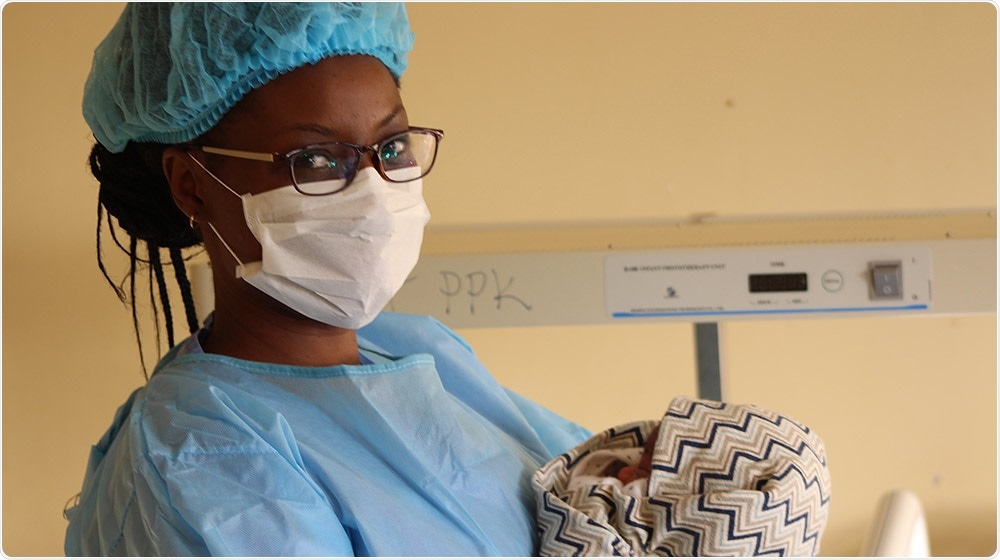The coronavirus pandemic has rippled across the globe, infecting nearly 18 million individuals worldwide to date. Though the coronavirus disease (COVID-19) affects people from all walks of life, women and girls may experience devastating effects of the outbreak.
Natalia Kanem, the executive director of the UN Population Fund, warns about disrupted health services for women and an increase in gender-based violence amid the ongoing pandemic. As the global health crisis increases, health experts fear that it may negatively impact women's and girls' sexual and reproductive health, impeding their access to care.

Midwife Margaret Thwala-Tembe says her clinic has seen a decline in women receiving antenatal and safe delivery services. © UNFPA Eswatini. Image Credit: UNPF
Limited access to healthcare
As the pandemic accelerates, many nations have implemented tough lockdowns and travel restrictions to contain the spread of the virus. While doing so, some countries have closed sexual and reproductive services since they were tagged as non-essential health services, which include contraception.
"This decision not only denied women and girls access to time-sensitive—and potentially life-saving—services, but also further distanced them from already difficult-to-access sexual and reproductive health care," the report added.
"In a word, it is devastating. There are many women in situations of desperation right now and all this tallies up to devastating health and social consequences for that woman, for that girl, for that family, for that community. We were doing okay, we still needed to accelerate progress, but nowhere you have a situation where we could actually go backward. It's unacceptable," Natalia Kanem explained.
Based on the estimates of UNFPA, there could be about 7 million unintended pregnancies across the globe due to the coronavirus pandemic, which may lead to thousands of deaths from unsafe abortion and complicated births because of the lack of access to emergency services. Also, one of the main concerns that may emerge are skyrocketing cases of gender-based violence.
Health experts are encouraging countries to look at ways of mitigating the effects in access to reproductive and sexual health services, including letting clinics and facilities that cater to women's health to remain open and provide the services they need.
WHO interim guidance
In March, the World Health Organization (WHO) has released interim guidance for maintaining essential services during an outbreak, including focusing on services tied to reproductive health and exerting efforts to prevent maternal and child mortality and morbidity.
The interim guidance was updated in June, which emphasized that all countries must strike a delicate balance between protecting health, reducing economic and social disruption, and respecting human rights. It also added that though health systems are overwhelmed, nations should balance the demands of responding to COVID-19 and, at the same time, engage in strategic planning and maintain essential health service delivery, including those for women such as rights to sexual and reproductive health care.
The WHO also emphasizes that access to effective contraception is one of the most cost-effective interventions to reduce maternal mortality by preventing unintended pregnancy. During the current situation, it is crucial to provide access to contraceptive services to reduce avoidable pressures in health systems and prevent the consequences of unintended pregnancies.
"To respond to requests for information from individuals, health care workers and policy-makers, WHO has developed responses to some frequently asked questions. These questions and answers may be updated or amended as more information and evidence becomes available," the WHO explained.
The health agency also emphasized the importance of protecting women and girls from violence, which is considered a significant global public health and women's health threat during emergencies. Even without the pandemic, violence against women remains highly prevalent, and it may worsen amid the stresses and pressures of the current coronavirus situation.
Globally, about 1 in 3 women have experienced physical or sexual violence by an intimate partner. It tends to increase during every type of emergency, including the coronavirus pandemic. Older women and those with disabilities are more likely to experience additional needs and risks. Further, those who are refugees, displaced, or living in conflict-affected areas are susceptible to violence.
Reports from the United Kingdom, the United States, China, and other countries show a surge in domestic violence cases since the COVID-19 outbreak started. In Hubei Province in China, where the outbreak first emerged, a police station in Jingzhou has reported that the number of domestic violence cases tripled in February 2020 compared with the same period in 2019.
"Violence against women can result in injuries and serious physical, mental, sexual and reproductive health problems, including sexually transmitted infections, HIV, and unplanned pregnancies," the WHO reported.
The WHO reiterates the importance of addressing women's health during the pandemic. It recommends that governments and policy-makers must include essential services to protect women against violence. Health facilities should also identify and provide information about the available services, including rape crisis centers, hotlines, counseling, and shelters for distressed women.
Sources:
Journal reference: